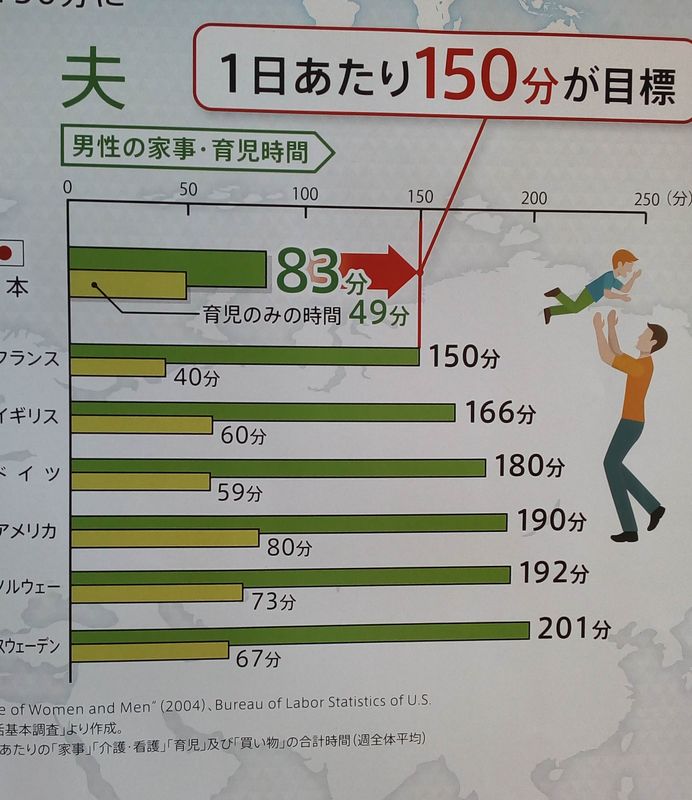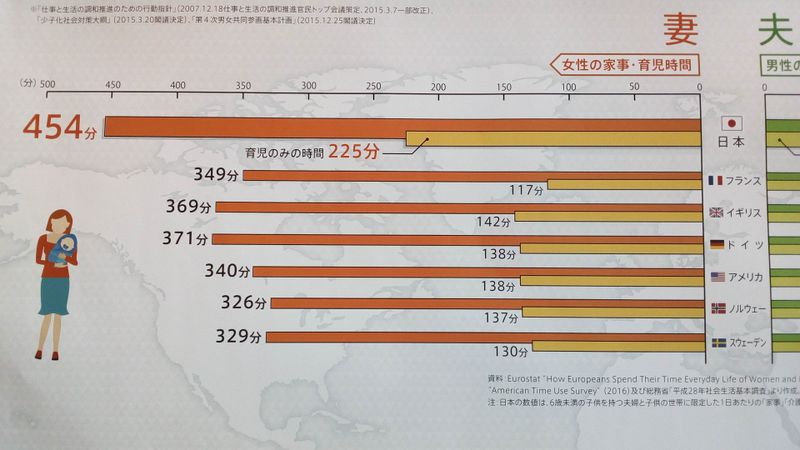Mar 20, 2018
Family Life: Who Does the Chores?
I recently saw a poster in a community center showing data on the topic of household chores and child rearing duties as divided by gender. There was a considerable gap in the number of hours Japanese men spent on household chores (82 minutes a day) as compared with the closest country, France (150 minutes a day). The poster urged Japanese men to 'step up' their household chores to help balance the amount of work done by their partners.

I find it interesting that the poster urges men to do more housework and child care, even if they only have some time on the weekends or holidays. This is in addition to the stereotypical long working hours in Japan.
In September 2017 a Canadian study was published showing that women consistently do more housework than men (in the case of heterosexual couples living together). Age didn't play an important role in the amount of housework done. Time and resources are motivators for how chores are divided, but gender, income, working hours, and child care are the most important factors, the study found.
I feel like the data for Japan on that poster is based on couples where the man works full time and the woman stays home to raise children and take care of the home. But what about career women? Why should they spend so much of their free time cleaning if they work just as much as their partners outside of the home?
Here's the other side of that poster - the data for women.

Articles related to the study bring up the economic downside to women spending so much time on housework and argue it should be divided more equally. If women feel they are responsible for too many chores, they will be less likely to have time available for working outside the home, even if they'd like to. Women are more likely to work part time than full time, and this contributes to the wage gap we still see around the world. This is especially significant in Japan where there is a shortage of workers.
Are women more likely to want their homes to be clean? I think this depends on the person more than gender. Are full time housewives cooking and cleaning more than they really need to because they have the time?
The household chores alone supposedly take an average of 7.5 hours a day for Japanese women. So it's a full time job. But this seems unrealistic to me.
I've never calculated how much time I spend on chores, but I think it's usually limited to a few hours a day including cooking all the meals at home. (Is this data consistent with how much time you're spending on chores? Maybe I'm just lazy?)
Back home and in Japan, I've seen and heard plenty of examples of busy husbands who do almost no housework at all, to the frustration of their wives. The women I talk to in Japan are usually shocked and call me lucky if they hear that my Japanese husband does his own laundry or washes dishes.
In my family, I feel quite fortunate that my husband does any household chores at all, as he works nonstop. I don't feel that I do an unfairly larger portion of the chores. When I worked full time, he took on more of the responsibility at home.
How about your household? You might feel like the household responsibilities fall unequally between partners, Japanese or otherwise.



2 Comments
genkidesu
on Mar 24
This was a really interesting read and definitely something that I was curious about! I'd say that my husband and I split things pretty equally - I'm a stay at home parent right now, but had my own career before kids - and my husband was the main income earner. He's now a student for the next couple of years here, but he definitely appreciates the fact that staying at home with kids is exhausting and helps accordingly. I honestly don't know what I'd do if it wasn't like that - I think if I was in a situation where my spouse didn't value my time and expected me to do everything around the house that I'd build up a pretty big level of resentment!
helloalissa
on Mar 25
@genkidesu Right, and I think everyone wants to avoid getting to the point of resentment. It seems like younger couples are talking about their responsibilities and sharing them more equally, fortunately. I feel like this data is hard to believe and wonder how they determined that average.